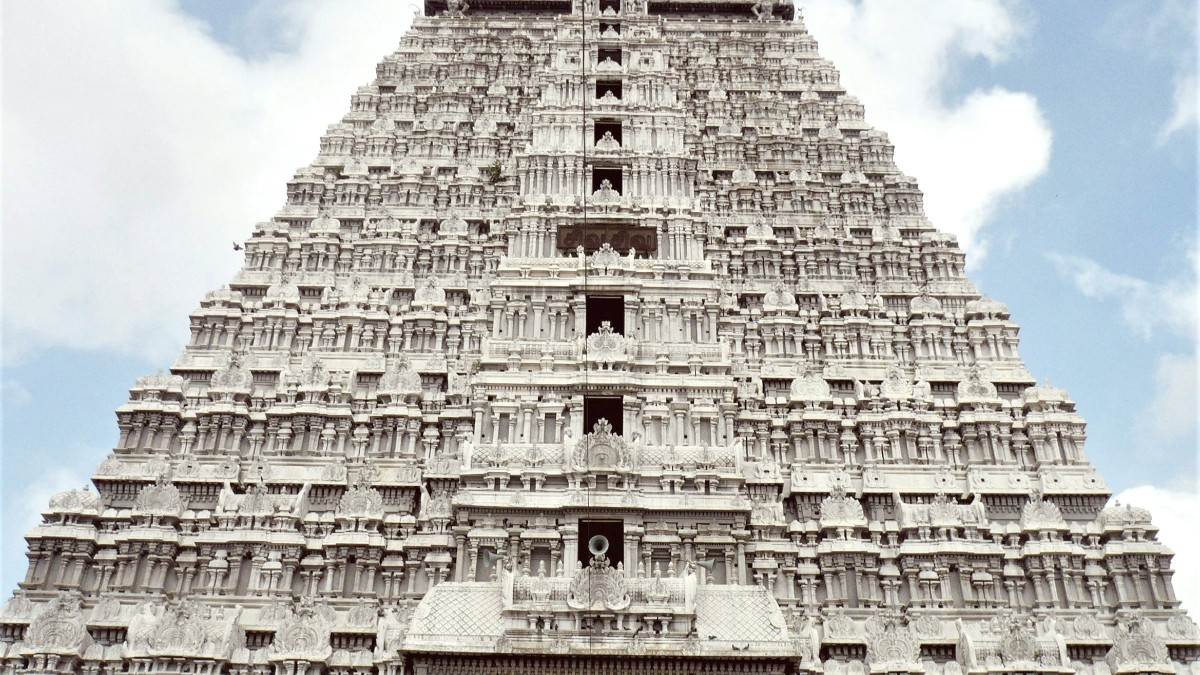
Tamil Nadu, India
Summer (March - June): This period marks the hottest part of the year. Temperatures frequently exceed 35°C (95°F), often peaking in April and May, sometimes reaching 40°C (104°F). Humidity remains high, making the heat feel more intense. Days are long and sunny, but outdoor activities during midday challenging.
Monsoon (July - September/October): The Southwest monsoon brings significant rainfall during these months. Temperatures drop slightly, but humidity remains elevated. Occasional heavy downpours occur, intense but usually short-lived.
Choose optimal times for comfort.
Girivalam: Perform this 14-kilometer walk in the cooler months, ideally between November and February. Start your walk early in the morning (before sunrise) or late in the evening to avoid the day's heat. The full moon (Pournami) nights are popular, with thousands participating, creating an unique spiritual atmosphere.
April - May
Temperatures peak, avoid midday outdoor activity.
Stay hydrated, light clothing.
July - Oct
Occasional heavy downpours, carry umbrella.
Remains elevated.
November - February
Comfortable conditions for exploration.
Higher tourist numbers, book in advance.
This is the most common, convenient option for tourists. Citizens of over 160 countries qualify. Apply online through the Official Indian government e-Visa website at least 4 days, but no more than 120 days, before arrival. Submit payment online. Print the Electronic Travel Authorization (ETA) and carry it with you.
This option suits those not eligible for the e-Visa or who prefer a traditional sticker visa in their passport. Apply at an Indian embassy or consulate in your home country. This usually means physical document submission and sometimes an interview.
Your passport must remain valid for at least six months beyond your planned departure date from India. Two blank pages for stamps.
Recent photographs (taken within the last three months) front-facing with a plain white background.
Complete the application form accurately, either online or physically.
Immigration officials sometimes request this as verification of your intent to leave India.
Demonstrate sufficient money to cover expenses. A bank statement or credit card statement often suffices.
India uses the Indian Rupee, and understanding its value helps you plan effectively.
The official currency is the Indian Rupee, symbolized as INR or ₹. Banknotes commonly exist in denominations of ₹10, ₹20, ₹50, ₹100, ₹200, ₹500, and ₹2000. Coins are available in ₹1, ₹2, ₹5, and ₹10.
Tipping is not always mandatory in India but appreciation for good service. Customary tips vary by service.
| Category | Budget Traveler (₹1,500 - ₹3,000 / USD 18 - 36 per day) | Mid-range Traveler (₹3,000 - ₹7,000 / USD 36 - 84 per day) | Luxury Traveler (₹7,000+ / USD 84+ per day) |
|---|---|---|---|
| Accommodation | Basic guesthouse/ashram (₹500-₹1,000) | Mid-range hotel with A/C (₹1,500-₹3,500) | Boutique hotel/resort (₹4,000+) |
| Meals | Local eateries, street food, ashram canteens (₹300-₹700) | Mid-range restaurants, occasional cafe (₹700-₹1,500) | Fine dining, international cuisine (₹1,500+) |
| Transportation | Local buses, shared auto-rickshaws, walking (₹100-₹300) | Auto-rickshaws, occasional pre-booked taxi (₹300-₹800) | Private car with driver (₹1,000-₹2,500+) |
| Attractions | Mostly free (temple entry is free) (₹0-₹100) | Guided tours, special temple darshan (₹100-₹300) | Private guides, exclusive experiences (₹500+) |
Prepare for potential health concerns and understand local safety practices.
Drink only bottled or purified water (check seal). Avoid ice, raw fruits/vegetables not peeled yourself. Carry Imodium A-D Caplets and ORS.
Dengue, Chikungunya present. Use Insect repellent containing DEET or picaridin. Wear long sleeves and pants at dawn/dusk.
Stay hydrated, wear loose, light clothing. Avoid strenuous midday activity. Use High SPF sunscreen, Wide-brimmed hat.
Hospitals available: Government Medical College Hospital, Arunai Medical College & Hospital. Numerous private clinics.
Pharmacies are easily accessible throughout the town. Most common medications are available over-the-counter.
Emergency Services: Police: 100, Ambulance: 108, Fire: 101. These numbers connect you to emergency services across India.
Keep a list of important contacts, including your hotel, embassy, and travel insurance emergency contact number.
Drink only bottled mineral water (verify seal intact), water from reputable purifiers, or water you purified yourself. Tap water not suitable. A Portable water filter or UV purifier is a good investment.
Eat hot, freshly cooked food. Avoid food from street vendors that appears unhygienic or has been sitting out. Opt for vegetarian food. Always wash your hands thoroughly before eating.
Avoid contact with stray animals (dogs, monkeys). If an animal bites or scratches you, seek immediate medical attention.
Tiruvannamalai generally a safe town for pilgrims and tourists. Crime rates low compared to major Indian cities.
Tiruvannamalai experiences a tropical climate with seasonal hazards.
During heavy monsoon rains (July-Oct, Nov-Dec), localized flooding and waterlogging can occur. Road travel and daily movement potentially affected.
Extreme heat in April-May poses risks of dehydration and heatstroke. Take precautions like staying hydrated and avoiding midday sun.
Comprehensive travel insurance highly recommended. Ensure coverage for medical emergencies, trip cancellation, lost baggage, flight delays. Consider policies from World Nomads or SafetyWing.